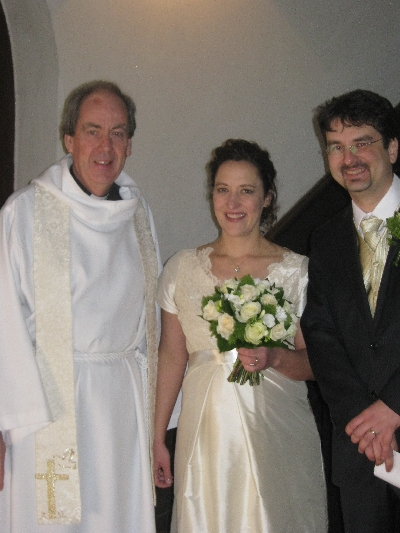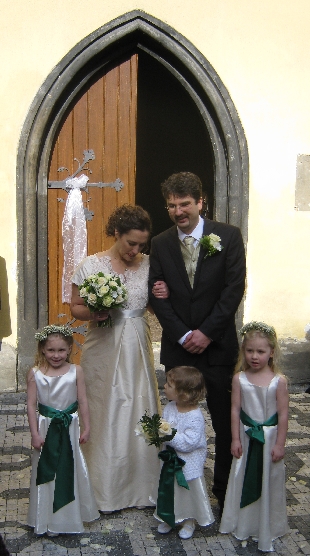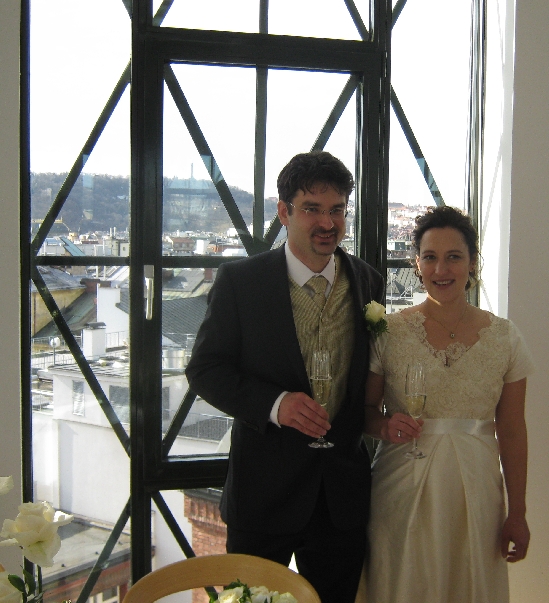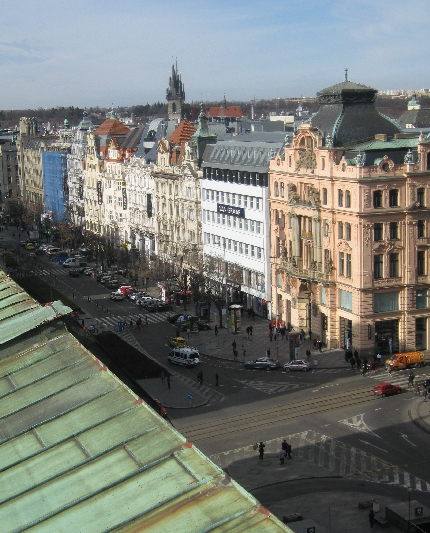
On Saturday 3rd March, I conducted my first wedding of 2012 when Petr, a Czech, married Kristin, an American. The wedding took place at St. Clement’s Church with a congregation made up of Petr’s Czech relatives, a small number of Kristin’s American relatives, together with numerous mutual friends.
This wedding presented all the usual problems that arise when I conduct a Czech to English-speaker marriage. Petr’s parents and older relatives do not understand or speak English. None of Kristin’s family speaks Czech except for Kristin herself who has lived in Prague for twenty years and has her own business here. How was I to conduct a service that would be understood and appreciated by everyone present?
As with previous Czech to English-speaker weddings, I got Petr and Kristin to produce a completely bilingual order of service to allow everyone present to follow the liturgy and Bible Readings, even when they were not being spoken in their own native language. But I also got my good friend Kvetoslav, Lay Vice President of the Czech Old Catholic Church, to help me with saying parts of the liturgy in Czech, as well as translating my words of welcome and explanation at the beginning of the service.

Therefore, Kvetoslav helped Petr make his vows to Kristin in Czech whilst I helped Kristin make her vows to Petr in English. And the couple chose two Bible Readings, one read in English by Kristin’s mother, and the other read in Czech by Petr’s niece.
We even managed to sing one hymn, admittedly only in English. We sang ‘Joyful, joyful, we adore thee’ which is an American hymn that appears in the ‘The Hymnal’ of the American Episcopal Church. Both Kristin and her parents are from the Episcopalian tradition in the USA. Fortunately, the hymn is set to Beethoven’s ‘Ode to Joy’, the official anthem of the European Union, so it did seem quite appropriate for a transatlantic marriage!
The wedding reception took place in the cupola on the top of a wonderful cubist style building located half-way up Václavské námestí/Wenceslas Square, which currently belongs to the Landesbank Baden-Württemberg. From the cupola, there are amazing views right across Prague as well as looking down on Václavské námestí/Wenceslas Square.
Together with some excellent food and wine, the guests were also entertained by a splendid jazz trio. And throughout the afternoon, both Sybille and I constantly received compliments as to how much everybody had enjoyed the service in Church, especially the way it had enabled both Czech and English speakers to participate and fully understand all that was being said and done.
Particularly from young Czechs, I got expressions of both appreciation, but also of surprise, in that they found the way I led the service both warm and welcoming and in total contrast to their past experience of attending occasional Czech Church services. Whilst it is always nice to be appreciated, it does sadden me that the experience of so many Czechs, is that the Christian Church is both cold and unwelcoming.
It is not the primary purpose of my being here in the Czech Republic, to minister to the spiritual needs of Czech people, but rather to the spiritual needs of native English-speakers. But I increasingly feel that the main reason that the Czech Republic is as atheistic or agnostic as it appears to be, is not because of a deliberate rejection of Christian faith by its population, but rather as a result of the failure of the Czech Christian Churches to be an attractive advert for the Christian faith.
|
|



Glad it went so well, Ricky. Your post demonstrates very clearly why it matters so much to do the occasional offices well. For some people it’s their only experience of the church.
Gorgeous views of Prague, but didn’t the bride and her bridesmaids freeze? Sleeveless dresses at the beginning of March? Brrr….
Thank you Perpetua – I concur entirely with the sentiments expressed in the first half of your comment. With regard to sleeveless dresses, both the bride and her bridesmaids had shawls to keep them warmer but took them off for the photos. However, for the last two or three weeks, including on the day of the wedding, it has been colder inside the Church than outside!
Dear Ricky, Your blog with the story of our daughter’s wedding is wonderful. Thank you so much for publishing it so that our friends can read it. Most of all, thank you for the thoughtfulness extended to our family and to Petr’s family in the care and love you put into this family event. It is certainly true that weddings and funerals are the events that show those outside our church what we are about. You were a wonderful witness to the inclusiveness and joy that we share. Carol Olson
Carol – Thank you for your kind words & for telling your friends about my blog. It does explain the high number of ‘hits’ the blog has received in the last 24 hours 🙂
As my friend Perpetua commented previously here, it is important that the ‘occasional offices’ (i.e. Weddings & Funerals) are done well as for many people it is their only experience of Church. From the conversations I had at the reception, it is quite clear that Petr & Kristin’s wedding did illustrate very positively what the Christian Church is about!
Hi Ricky, This is not actually on the subject of this blog, but I’ve written it here since it is your most recent. I thought that your readers might be interested to look at this article in this week’s ‘Economist’ about the rise of evangelicalism in the Church of England. http://www.economist.com/node/21549943 The good news is that, although the rise of evangelicalism is swift, it is mostly not of the more scary American type.
Here’s another recent article: http://www.economist.com/node/21541399
I subscribe to the Economist, and there are often quite interesting articles on the C of E, if you would like me to post them.
Hi Peter,
I don’t normally allow ‘off topic’ comments – unfortunately I get a lot of them which are purely spam, or people trying to establish backlinks to dubious, unrelated websites. However, I do appreciate that your comment is completely genuine 🙂 And what the recent article from the ‘Economist’ describes, is a trend within the Church of England which has been ongoing for at least the last twenty or thirty years.
Hi Ricky,
I got married in Czecho donkeys’ years ago, first in a town hall, and then in Church for a blessing. I smiled at the priest, and he glared at me with an intensely miserable scowling face, and all that with an angelic voice singing Ave Marie in the background. And the lady who was supposed to interpret everything to EN was just having a good time doing nothing, I had no idea what was going on.
I now joke with my CZ friends that I only recently found out I was married,as I thought it was all a baptism 🙂
On top of all that the video camera broke down as well.
Sounds like your wedding went a lot better :-)))
Best wishes, Mike
Hi again Mike – I’m sorry to hear that your experience of your civil marriage being blessed by a Czech RC priest was so bad. Yet it sadly bears out what was said to me, both first-hand by Czech guests who spoke English, & second-hand via translation from other Czechs who did not speak English, about their past experiences of attending a Czech Church wedding.
Making the service accessible in both languages & being warm & friendly I regard as the minimum requirement in such circumstances.
Hi, Ricky Yates!
I’m glad your Czech-English wedding ceremony was completed without any major hitches. It sounds like it would have been fun to watch all the translating in action…LOL! Is Czech a very hard language to learn?
Interestingly enough, I attend a Spanish-speaking Mass but I can’t speak a word of Spanish! Therefore, I just read the liturgy in English while everyone else is following along in Spanish.
Out of any language, I would really like to learn Welsh. I know a few spranglings…Ydych chi siarad Cymraeg? Sut mae chi? etc. But I probably wouldn’t be able to keep a conversation going with a Welsh speaker for more than 10 seconds at most!
Do you know/would you like to learn any other foreign language?
God Bless,
Pearl
Hi Pearl – Thank you for visiting & yes – the wedding was great fun as well as being a solemn occasion as Petr & Kristin made their vows to each other.
To answer your language questions:
Czech is a very difficult language to learn. It has four genders and seven cases and bears no relation to any of the languages my wife or I are familiar with.
I siarad ychydig o Gymraeg. I did my first degree at Lampeter in a predominantly Welsh-speaking area of Wales and was confirmed in Yr Eglwys yng Nghymru / The Anglican Church in Wales. I attended many bilingual services during my three years in Wales meaning that my best Welsh is liturgical.
My wife is German & speaks four languages fluently (German, English, French & Spanish) & Ich spreche ein bisschen Deutsch und verstehen mehr.
Hello Ricky,
We are trying to follow in your footsteps and get a Czech registration number for our car. I am a Czech citizen and have moved back to Czech after 14 years. We thought we will bring our car with us, as it is only 5 years old. I have been on the phone for the last 2 weeks and I seem to be getting different information from different people. So far I managed to locate a local STK garage, that can do it. They have also told me to get a Certificate of exemption from Ministry of Transport. They also asked me for Certificate of conformity. I have not got a clue what that is, but was told to ask the manufacture of the car. Any idea what are they talking about? Also the garage told me it is very expensive to get it all sorted, so is it really worth it?
Thank you for any information on this subject
Andrea Pines
Hi Andrea – I assume you left your comment here on this post as comments are closed on posts that are more than three months old. But I assume you are referring to my earlier posts http://rickyyates.com/driving-on-the-right-side-of-the-road/ & http://rickyyates.com/check-this-czech-car-out/ .
As I outline in these two earlier posts, you do need to get your car through an STK test & obtain mechanical & emissions protokols. You will certainly first need to have your headlights changed but that should be the only big expense. I don’t exactly understand what is meant by a ‘certificate of conformity’ but I presume it refers to what I describe as a ‘mirrors test’, to prove your vision isn’t impaired. With these three protokols, you should then be able to apply to the Czech Ministry of Transport for a ‘Certificate of exemption’. To obtain one, you will have to promise not to sell the car to another Czech!
As I always advise those who ask me about this, do contact my good friend Adrian http://www.milkot.cz/en/index_en.php?str=kontakt. He knows all about what is involved in registering a RHD car in the Czech Republic.